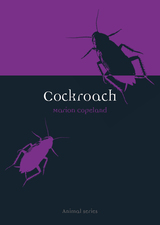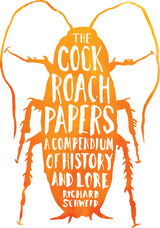2 books about Cockroaches

Cockroach
Marion Copeland
Reaktion Books, 2004
The cockroach could not have scuttled along, almost unchanged, for two hundred and fifty million years – some two hundred and forty-nine before man evolved – unless it was doing something right. It would be fascinating as well as instructive to have access to the cockroach’s own record of its life on earth, to know its point of view on evolution and species domination over the millennia. Such chronicles would perhaps radically alter our perceptions of the dinosaur’s span and importance – and that of our own development and significance. We might learn that throughout all these aeons, the dominant life form has been, if not the cockroach itself, then certainly the insect.
Attempts to chronicle the cockroach’s intellectual and emotional life have been made only within the last century when a scientist titled his essay on the cockroach "The Intellectual and Emotional World of the Cockroach", and artists as radically different as Franz Kafka and Don Marquis created equally memorable cockroach protagonists.
At least since Classical Greece, authors have brought cockroach characters into the foreground to speak for the weak and downtrodden, the outsiders, those forced to survive on the underside of dominant human cultures. Cockroaches have become the subjects of songs (La Cucaracha), have competed in "roachraces" and have even ended up in recipes. In this accessible, sympathetic and often humorous book, Marion Copeland examines the natural history, symbolism and cultural significance of this poorly understood and much-maligned insect.
Attempts to chronicle the cockroach’s intellectual and emotional life have been made only within the last century when a scientist titled his essay on the cockroach "The Intellectual and Emotional World of the Cockroach", and artists as radically different as Franz Kafka and Don Marquis created equally memorable cockroach protagonists.
At least since Classical Greece, authors have brought cockroach characters into the foreground to speak for the weak and downtrodden, the outsiders, those forced to survive on the underside of dominant human cultures. Cockroaches have become the subjects of songs (La Cucaracha), have competed in "roachraces" and have even ended up in recipes. In this accessible, sympathetic and often humorous book, Marion Copeland examines the natural history, symbolism and cultural significance of this poorly understood and much-maligned insect.
[more]

The Cockroach Papers
A Compendium of History and Lore
Richard Schweid
University of Chicago Press, 2015
Skittering figures of urban legend—and a ubiquitous reality—cockroaches are nearly as abhorred as they are ancient. Even as our efforts to exterminate them have developed into ever more complex forms of chemical warfare, roaches’ basic design of six legs, two hypersensitive antennae, and one set of voracious mandibles has persisted unchanged for millions of years. But as Richard Schweid shows in The Cockroach Papers, while some species of these evolutionary superstars do indeed plague our kitchens and restaurants, exacerbate our asthma, and carry disease, our belief in their total villainy is ultimately misplaced.
Traveling from New York City to Louisiana, Mexico, Nicaragua, and Morocco, Schweid blends stories of his own squirm-inducing roach encounters with meticulous research to spin a tale both humorous and harrowing. As he investigates roaches’ more nefarious interactions with our species—particularly with those of us living at the margins of society—Schweid also explores their astonishing diversity, how they mate, what they’ll eat, and what we’ve written about them (from Kafka and Nelson Algren to archy and mehitabel). Knowledge soon turns into respect, and Schweid looks beyond his own fears to arrive at an uncomfortable truth: We humans are no more peaceful, tidy, or responsible about taking care of the Earth or each other than these tiny creatures that swarm in the dark corners of our minds, homes, and cereal boxes.
Traveling from New York City to Louisiana, Mexico, Nicaragua, and Morocco, Schweid blends stories of his own squirm-inducing roach encounters with meticulous research to spin a tale both humorous and harrowing. As he investigates roaches’ more nefarious interactions with our species—particularly with those of us living at the margins of society—Schweid also explores their astonishing diversity, how they mate, what they’ll eat, and what we’ve written about them (from Kafka and Nelson Algren to archy and mehitabel). Knowledge soon turns into respect, and Schweid looks beyond his own fears to arrive at an uncomfortable truth: We humans are no more peaceful, tidy, or responsible about taking care of the Earth or each other than these tiny creatures that swarm in the dark corners of our minds, homes, and cereal boxes.
[more]
READERS
Browse our collection.
PUBLISHERS
See BiblioVault's publisher services.
STUDENT SERVICES
Files for college accessibility offices.
UChicago Accessibility Resources
home | accessibility | search | about | contact us
BiblioVault ® 2001 - 2024
The University of Chicago Press









